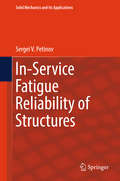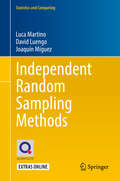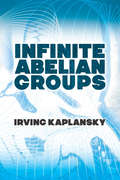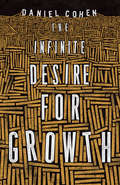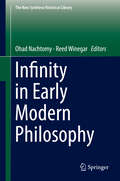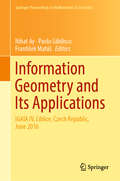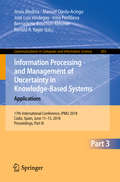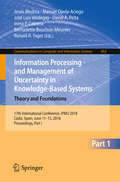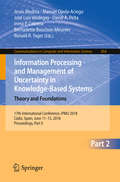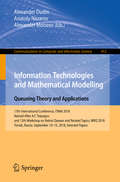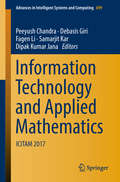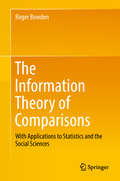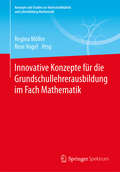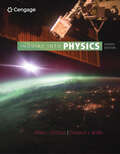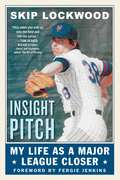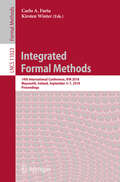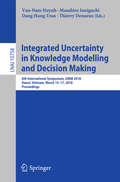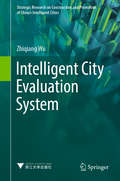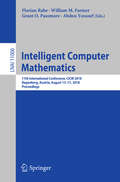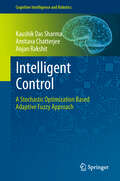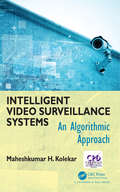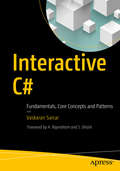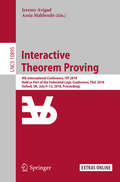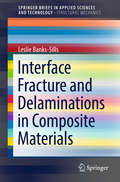- Table View
- List View
In-Service Fatigue Reliability of Structures (Solid Mechanics and Its Applications #251)
by Sergei V. PetinovThis book provides readers with the latest know-how and tools needed to assess the in-service strength and reliability of welded structures. It addresses the two principal mechanisms of structural material deterioration, fatigue and corrosion, which affect the in-service behavior of structures. In this regard, the primary focus is on fatigue in connection with various structural failure scenarios. Realistic and typical examples of welded structures’ design and residual life assessment are used throughout the book in order to show readers the complexity of real-world assessments. The book offers a valuable resource for master’s students in mechanical and civil engineering, and for engineers whose work involves fatigue design and in-service inspections of welded structures.
Independent Random Sampling Methods (Statistics And Computing Ser.)
by Luca Martino David Luengo Joaquín MíguezThis book systematically addresses the design and analysis of efficient techniques for independent random sampling. Both general-purpose approaches, which can be used to generate samples from arbitrary probability distributions, and tailored techniques, designed to efficiently address common real-world practical problems, are introduced and discussed in detail. In turn, the monograph presents fundamental results and methodologies in the field, elaborating and developing them into the latest techniques. The theory and methods are illustrated with a varied collection of examples, which are discussed in detail in the text and supplemented with ready-to-run computer code.The main problem addressed in the book is how to generate independent random samples from an arbitrary probability distribution with the weakest possible constraints or assumptions in a form suitable for practical implementation. The authors review the fundamental results and methods in the field, address the latest methods, and emphasize the links and interplay between ostensibly diverse techniques.
Infinite Abelian Groups (Dover Books on Mathematics)
by Irving KaplanskyIn the Introduction to this concise monograph, the author states his two main goals: first, "to make the theory of infinite abelian groups available in a convenient form to the mathematical public; second, to help students acquire some of the techniques used in modern infinite algebra." <P><P>Suitable for advanced undergraduates and graduate students in mathematics, the text requires no extensive background beyond the rudiments of group theory.Starting with examples of abelian groups, the treatment explores torsion groups, Zorn's lemma, divisible groups, pure subgroups, groups of bounded order, and direct sums of cyclic groups. <P><P>Subsequent chapters examine Ulm's theorem, modules and linear transformations, Banach spaces, valuation rings, torsion-free and complete modules, algebraic compactness, characteristic submodules, and the ring of endomorphisms. Many exercises appear throughout the book, along with a guide to the literature and a detailed bibliography.
The Infinite Desire for Growth
by Daniel Cohen Jane ToddWhy society’s expectation of economic growth is no longer realisticEconomic growth--and the hope of better things to come—is the religion of the modern world. Yet its prospects have become bleak, with crashes following booms in an endless cycle. In the United States, eighty percent of the population has seen no increase in purchasing power over the last thirty years and the situation is not much better elsewhere. The Infinite Desire for Growth spotlights the obsession with wanting more, and the global tensions that have arisen as a result. Amid finite resources, increasing populations, environmental degradation, and political unrest, the quest for new social and individual goals has never been so critical.Leading economist Daniel Cohen provides a whirlwind tour of the history of economic growth, from the early days of civilization to modern times, underscoring what is so unsettling today. The new digital economy is establishing a "zero-cost" production model, inexpensive software is taking over basic tasks, and years of exploiting the natural world have begun to backfire with deadly consequences. Working hard no longer guarantees social inclusion or income. Drawing on economics, anthropology, and psychology, and thinkers ranging from Rousseau to Keynes and Easterlin, Cohen examines how a future less dependent on material gain might be considered and, how, in a culture of competition, individual desires might be better attuned to the greater needs of society.At a time when wanting what we haven't got has become an obsession, The Infinite Desire for Growth explores the ways we might reinvent, for the twenty-first century, the old ideal of social progress.
Infinity in Early Modern Philosophy (The\new Synthese Historical Library #76)
by Reed Winegar Ohad NachtomyThis volume contains essays that examine infinity in early modern philosophy. The essays not only consider the ways that key figures viewed the concept. They also detail how these different beliefs about infinity influenced major philosophical systems throughout the era. These domains include mathematics, metaphysics, epistemology, ethics, science, and theology.Coverage begins with an introduction that outlines the overall importance of infinity to early modern philosophy. It then moves from a general background of infinity (before early modern thought) up through Kant. Readers will learn about the place of infinity in the writings of key early modern thinkers. The contributors profile the work of Descartes, Spinoza, Leibniz, and Kant. Debates over infinity significantly influenced philosophical discussion regarding the human condition and the extent and limits of human knowledge. Questions about the infinity of space, for instance, helped lead to the introduction of a heliocentric solar system as well as the discovery of calculus. This volume offers readers an insightful look into all this and more. It provides a broad perspective that will help advance the present state of knowledge on this important but often overlooked topic.
Information Geometry and Its Applications: On The Occasion Of Shun-ichi Amari's 80th Birthday, Liblice, Czech Republic, June 2016 (Springer Proceedings in Mathematics & Statistics #252)
by Nihat Ay Paolo Gibilisco František MatúšThe book gathers contributions from the fourth conference on Information Geometry and its Applications, which was held on June 12–17, 2016, at Liblice Castle, Czech Republic on the occasion of Shun-ichi Amari’s 80th birthday and was organized by the Czech Academy of Sciences’ Institute of Information Theory and Automation. The conference received valuable financial support from the Max Planck Institute for Mathematics in the Sciences (Information Theory of Cognitive Systems Group), Czech Academy of Sciences’ Institute of Information Theory and Automation, and Università degli Studi di Roma Tor Vergata. The aim of the conference was to highlight recent advances in the field of information geometry and to identify new research directions. To this end, the event brought together leading experts in the field who, in invited talks and poster sessions, discussed both theoretical work and achievements in the many fields of application in which information geometry plays an essential role.
Information Processing and Management of Uncertainty in Knowledge-Based Systems. Applications: 17th International Conference, IPMU 2018, Cádiz, Spain, June 11-15, 2018, Proceedings, Part III (Communications in Computer and Information Science #855)
by Jesús Medina Manuel Ojeda-Aciego José Luis Verdegay Irina Perfilieva Bernadette Bouchon-Meunier Ronald R. YagerThis three volume set (CCIS 853-855) constitutes the proceedings of the 17th International Conference on Information Processing and Management of Uncertainty in Knowledge-Based Systems, IPMU 2017, held in Cádiz, Spain, in June 2018.The 193 revised full papers were carefully reviewed and selected from 383 submissions. The papers are organized in topical sections on advances on explainable artificial intelligence; aggregation operators, fuzzy metrics and applications; belief function theory and its applications; current techniques to model, process and describe time series; discrete models and computational intelligence; formal concept analysis and uncertainty; fuzzy implication functions; fuzzy logic and artificial intelligence problems; fuzzy mathematical analysis and applications; fuzzy methods in data mining and knowledge discovery; fuzzy transforms: theory and applications to data analysis and image processing; imprecise probabilities: foundations and applications; mathematical fuzzy logic, mathematical morphology; measures of comparison and entropies for fuzzy sets and their extensions; new trends in data aggregation; pre-aggregation functions and generalized forms of monotonicity; rough and fuzzy similarity modelling tools; soft computing for decision making in uncertainty; soft computing in information retrieval and sentiment analysis; tri-partitions and uncertainty; decision making modeling and applications; logical methods in mining knowledge from big data; metaheuristics and machine learning; optimization models for modern analytics; uncertainty in medicine; uncertainty in Video/Image Processing (UVIP).
Information Processing and Management of Uncertainty in Knowledge-Based Systems. Theory and Foundations: 17th International Conference, IPMU 2018, Cádiz, Spain, June 11-15, 2018, Proceedings, Part I (Communications in Computer and Information Science #853)
by Jesús Medina Manuel Ojeda-Aciego José Luis Verdegay David A. Pelta Inma P. Cabrera Bernadette Bouchon-Meunier Ronald R. YagerThis three volume set (CCIS 853-855) constitutes the proceedings of the 17th International Conference on Information Processing and Management of Uncertainty in Knowledge-Based Systems, IPMU 2017, held in Cádiz, Spain, in June 2018.The 193 revised full papers were carefully reviewed and selected from 383 submissions. The papers are organized in topical sections on advances on explainable artificial intelligence; aggregation operators, fuzzy metrics and applications; belief function theory and its applications; current techniques to model, process and describe time series; discrete models and computational intelligence; formal concept analysis and uncertainty; fuzzy implication functions; fuzzy logic and artificial intelligence problems; fuzzy mathematical analysis and applications; fuzzy methods in data mining and knowledge discovery; fuzzy transforms: theory and applications to data analysis and image processing; imprecise probabilities: foundations and applications; mathematical fuzzy logic, mathematical morphology; measures of comparison and entropies for fuzzy sets and their extensions; new trends in data aggregation; pre-aggregation functions and generalized forms of monotonicity; rough and fuzzy similarity modelling tools; soft computing for decision making in uncertainty; soft computing in information retrieval and sentiment analysis; tri-partitions and uncertainty; decision making modeling and applications; logical methods in mining knowledge from big data; metaheuristics and machine learning; optimization models for modern analytics; uncertainty in medicine; uncertainty in Video/Image Processing (UVIP).
Information Processing and Management of Uncertainty in Knowledge-Based Systems. Theory and Foundations: 17th International Conference, IPMU 2018, Cádiz, Spain, June 11-15, 2018, Proceedings, Part II (Communications in Computer and Information Science #854)
by Jesús Medina Manuel Ojeda-Aciego José Luis Verdegay David A. Pelta Inma P. Cabrera Bernadette Bouchon-Meunier Ronald R. YagerThis three volume set (CCIS 853-855) constitutes the proceedings of the 17th International Conference on Information Processing and Management of Uncertainty in Knowledge-Based Systems, IPMU 2017, held in Cádiz, Spain, in June 2018.The 193 revised full papers were carefully reviewed and selected from 383 submissions. The papers are organized in topical sections on advances on explainable artificial intelligence; aggregation operators, fuzzy metrics and applications; belief function theory and its applications; current techniques to model, process and describe time series; discrete models and computational intelligence; formal concept analysis and uncertainty; fuzzy implication functions; fuzzy logic and artificial intelligence problems; fuzzy mathematical analysis and applications; fuzzy methods in data mining and knowledge discovery; fuzzy transforms: theory and applications to data analysis and image processing; imprecise probabilities: foundations and applications; mathematical fuzzy logic, mathematical morphology; measures of comparison and entropies for fuzzy sets and their extensions; new trends in data aggregation; pre-aggregation functions and generalized forms of monotonicity; rough and fuzzy similarity modelling tools; soft computing for decision making in uncertainty; soft computing in information retrieval and sentiment analysis; tri-partitions and uncertainty; decision making modeling and applications; logical methods in mining knowledge from big data; metaheuristics and machine learning; optimization models for modern analytics; uncertainty in medicine; uncertainty in Video/Image Processing (UVIP).
Information Technologies and Mathematical Modelling. Queueing Theory and Applications: 17th International Conference, ITMM 2018, Named After A.F. Terpugov, and 12th Workshop on Retrial Queues and Related Topics, WRQ 2018, Tomsk, Russia, September 10-15, 2018, Selected Papers (Communications in Computer and Information Science #912)
by Alexander Dudin Anatoly Nazarov Alexander MoiseevThis book constitutes the proceedings of the 17th International Conference on Information Technologies and Mathematical Modelling, ITMM 2018, named after A.F. Terpugov, and the 12th Workshop on Retrial Queues and Related Topics, held in Tomsk, Russia, in September 2018. The 30 papers presented in this volume were carefully reviewed and selected from 84 submissions. The conference covers various aspects of information technologies, focusing on queueing theory, stochastic processes, Markov processes, renewal theory, network performance equation and network protocols.
Information Technology and Applied Mathematics: Icitam 2017 (Advances In Intelligent Systems And Computing #699)
by Dipak Kumar Jana Samarjit Kar Fagen Li Debasis Giri Peeyush ChandraThis book discusses recent advances and contemporary research in the field of cryptography, security, mathematics and statistics, and their applications in computing and information technology. Mainly focusing on mathematics and applications of mathematics in computer science and information technology, it includes contributions from eminent international scientists, researchers, and scholars. The book helps researchers update their knowledge of cryptography, security, algebra, frame theory, optimizations, stochastic processes, compressive sensing, functional analysis, and complex variables.
The Information Theory of Comparisons: With Applications to Statistics and the Social Sciences
by Roger BowdenThis book finds a broad domain of relevance in statistics and the social sciences. Its conceptual development is supported by applications to economics and income distribution, finance, education, demographics and actuarial science, political studies, psychology, and general statistics. Fresh perspectives on directional complexity have generated an informational theory of ‘more versus less’, with representative polar outcomes as good or bad, or rich or poor. New duality metrics for spread and asymmetry have resulted, motivated by internal perspectives on the part of subjects, such as attitudes to their comparative (dis)advantage. This book is a readable review of these developments. Concepts and applications are described in tandem with each other. They consolidate recent contributions to the research literature, augmented with fresh insights and applications. Dynamic extensions include modeling shifting social attitudes, while the broader agenda encompasses topical areas such as subjectivist probability, investment decision making, and income distribution.
Innovative Konzepte für die Grundschullehrerausbildung im Fach Mathematik (Konzepte und Studien zur Hochschuldidaktik und Lehrerbildung Mathematik)
by Rose Vogel Regina MöllerDer Band stellt innovative Konzepte in der Grundschullehrbildung aus den verschiedenen Bundesländern vor. Anlässe, Innovationen in der Grundschulausbildung vorzustellen und darüber Reflexionen anzuregen, gibt es viele: so zum Beispiel die strukturelle Vielfalt in der Grundschullehrerausbildung in den einzelnen Bundesländern, die unterschiedliche Gewichtung mathematischer und mathematikdidaktischer Kompetenzen im Kontext heterogener Ausbildungsbedingungen und differenzierte Konkretisierungen der Standards für die Lehrerbildung im Fach Mathematik. Im Fokus dieses Bandes stehen hochschuldidaktische Lehrkonzepte im Sinne von good “practice“. Im Einzelnen gilt es darzustellen, auszuloten und zu reflektieren zu welchen Auswirkungen die vorangegangenen Reformen der letzten zwanzig Jahre mit ihrer Neustrukturierung der Lehrerbildung samt gestufter Studienstruktur mit Bachelor- und Masterabschlüssen geführt haben. Neben landespezifischen Akzentsetzungen fokussieren sich diese Bemühungen auf eine stärkere Praxisorientierung während der Ausbildung, auf Intensivierung der Beziehungen zwischen den einzelnen Ausbildungsphasen, auf die besondere Bedeutung der sogenannten Berufseingangsphase und auf Maßnahmen zur Verbesserung der Lehrtätigkeit im Hinblick auf diagnostische und methodische Kompetenzen.
Inquiry into Physics (MindTap Course List)
by Vern J. Ostdiek Donald J. BordWhat do iPods, GPS devices, airport metal detectors, LCD displays, and PET scans have to do with physics? The Eighth Edition of INQUIRY INTO PHYSICS answers these questions and many others, helping you understand fundamental concepts using a unique inquiry-based approach. The text integrates modern applications of physics such as plasma TVs and radar "guns" to demonstrate the relevance of physics in daily life.
Insight Pitch: My Life as a Major League Closer
by Skip Lockwood Fergie JenkinsYou're straddling the pitcher's mound in Shea Stadium. The game rests in your hands. Your heart is pounding. Big money is at stake. You feel thousands of eyes burning your jersey as they wait for a pitch. You gulp at the air trying to settle your nerves. It's go time. Insight Pitch is a sports story that spills over three decades. Retired Major League Baseball pitcher Skip Lockwood tells anecdotes from throughout his career as a ballplayer, starting with his days as a Little Leaguer through his professional tenure with the Kansas City Athletics, Seattle Pilots, Milwaukee Brewers, California Angels, New York Mets, and Boston Red Sox, before his retirement in 1980. Along the way, he details both the on- and off-the-field shenanigans as well as the enormous psychological process that he underwent each and every time he took the mound. Readers will find some laughs along the way and marvel as they share the locker room with legends like Jesse Owens, Satchel Paige, Catfish Hunter, and Yogi Berra. Humorous but insightful, this book makes the perfect addition to any baseball fan's shelf.
Integrated Formal Methods: 14th International Conference, IFM 2018, Maynooth, Ireland, September 5-7, 2018, Proceedings (Lecture Notes in Computer Science #11023)
by Carlo A. Furia Kirsten WinterThis book constitutes the refereed proceedings of the 14th International Conference on Integrated Formal Methods, IFM 2018, held in Maynooth, Ireland, in September 2018.The 17 full papers and 5 short papers presented together with 3 invited talks were carefully reviewed and selected from 60 submissions. The conference covers a broad spectrum of topics: from language design, to verification and analysis techniques, to supporting tools and their integration into software engineering practice.
Integrated Mathematics, 1
by Timothy D. Kanold Edward B. Burger Juli K. DixonNIMAC-sourced textbook
Integrated Uncertainty in Knowledge Modelling and Decision Making: 6th International Symposium, IUKM 2018, Hanoi, Vietnam, March 15-17, 2018, Proceedings (Lecture Notes in Computer Science #10758)
by Van-Nam Huynh Masahiro Inuiguchi Dang Hung Tran Thierry DenoeuxThis book constitutes the refereed proceedings of the 6th International Symposium on Integrated Uncertainty in Knowledge Modelling and Decision Making, IUKM 2018, held in Hanoi, Vietnam, in March 2018.The 39 revised full papers presented in this book were carefully reviewed and selected from 76 initial submissions. The papers are organized in topical sections on uncertainty management and decision support; clustering and classification; machine learning applications; statistical methods; and econometric applications.
Intelligent City Evaluation System (Strategic Research on Construction and Promotion of China's Intelligent Cities)
by Zhiqiang WuThis book assesses various intelligent-city evaluation systems around the globe, and subsequently combines that assessment with local-government and enterprise practices to create an evaluation index system for quantifying the Intelligent City concept. In addition, the book provides the results of the CityIQ indicator ranking of intelligent cities in China and worldwide, a system that focuses on three of the most crucial aspects of urban development: the development environment, future trends, and construction and operation. After data sorting, calculation and dimensionless treatment, a score system ranging from 0 to 100 is created for ranking and analyzing cities. Providing unique strategies for promoting an intelligent city evaluation system, the book offers a valuable reference guide for intelligent-city decision-makers, as well as leaders in public urban economy, social welfare and environmental authorities.
Intelligent Computer Mathematics: 11th International Conference, CICM 2018, Hagenberg, Austria, August 13-17, 2018, Proceedings (Lecture Notes in Computer Science #11006)
by Florian Rabe William M. Farmer Grant O. Passmore Abdou YoussefThis book constitutes the refereed proceedings of the 11th International Conference on Intelligent Computer Mathematics, CICM 2018, held in Hagenberg, Austria, in August 2018. The 23 full papers presented were carefully reviewed and selected from a total of 36 submissions. The papers focos on the Calculemus, Digital Mathematics Libraries, and Mathematical Knowledge Management tracks which also correspond to the subject areas of the predecessor meetings. Orthogonally, the Systems and Projects track called for descriptions of digital resources, such as data and systems, and of projects, whether old, current, or new, and survey papers covering any topics of relevance to the CICM community.
Intelligent Control: A Stochastic Optimization Based Adaptive Fuzzy Approach (Cognitive Intelligence and Robotics)
by Kaushik Das Sharma Amitava Chatterjee Anjan RakshitThis book discusses systematic designs of stable adaptive fuzzy logic controllers employing hybridizations of Lyapunov strategy-based approaches/H∞ theory-based approaches and contemporary stochastic optimization techniques. The text demonstrates how candidate stochastic optimization techniques like Particle swarm optimization (PSO), harmony search (HS) algorithms, covariance matrix adaptation (CMA) etc. can be utilized in conjunction with the Lyapunov theory/H∞ theory to develop such hybrid control strategies. The goal of developing a series of such hybridization processes is to combine the strengths of both Lyapunov theory/H∞ theory-based local search methods and stochastic optimization-based global search methods, so as to attain superior control algorithms that can simultaneously achieve desired asymptotic performance and provide improved transient responses. The book also demonstrates how these intelligent adaptive control algorithms can be effectively utilized in real-life applications such as in temperature control for air heater systems with transportation delay, vision-based navigation of mobile robots, intelligent control of robot manipulators etc.
Intelligent Video Surveillance Systems: An Algorithmic Approach
by Maheshkumar H KolekarThis book will provide an overview of techniques for visual monitoring including video surveillance and human activity understanding. It will present the basic techniques of processing video from static cameras, starting with object detection and tracking. The author will introduce further video analytic modules including face detection, trajectory analysis and object classification. Examining system design and specific problems in visual surveillance, such as the use of multiple cameras and moving cameras, the author will elaborate on privacy issues focusing on approaches where automatic processing can help protect privacy.
Interactive C#
by Vaskaran Sarcar[Announcement-Thanks for your interest in Interactive Object-Oriented Programming in C# and making this book as "No. 1 New Release". You motivated us to do some further modification and fine-tune this work. The heart of the book is Part-1 which focuses on Object-Oriented programming. But we are covering much more in this book and so, based on the readers feedback, we are bringing the upcoming and fine-tuned version of the book as "Interactive C#" very soon. You will be able to preorder the book shortly. So, stay tuned !!]Are you afraid of programming? Or, perhaps you experimented with some other programming languages and now want learn C#? Or, you want to learn fast but do not want to miss the key concepts? If the answer is yes for any of these questions, then you are at the right place. 1. The book consists of four major sections which cover 15 core topics - 9 of them are dedicated to object oriented programming, 5 of them are dedicated to advanced concepts of C#,1 of them is dedicated to design patterns which covers 3 Gang of Four design patterns with C# implementations. Finally, you will get a FAQ section to cover all of these. 2. Why do we put so much emphasis on the word "core"? It is because, world is changing and new features will keep evolving but core concepts are evergreen. All new features are built on top of those. If you have a strong foundation, you can adopt the upcoming features quickly because you can understand the reason behind those changes. So, the book focuses on core topics in depth but does not try to cover "a-z" in C# at the same time. 3. This book is interactive . With it, you can feel that you are learning in a classroom environment where your teacher is discussing some topics and asking you questions. At the same time, you can clear your doubts by asking counter questions. It is very much important because many students cannot ask questions in an open forum due to many psychological factors. If you are dedicated to this subject and repeatedly think about these Q&A sessions, you can remake yourself in the programming world. 4. This book will not invest time on topics that are easily available e. g. how to install visual studio in your system or how to write a "hello world' program etc. On the contrary, the book contains a section that provides some fundamental theories with some interesting questions/answers in the topics like-IL code, selection, iteration and jump statements, arrays, strings, structures ,enumerations etc. , so that ,you can learn and evaluate your skills in those topics. This section will act like a reference. Gradually upon repeated practice, you will be familiar with it. This section will also help you to prepare yourself before a job interview or a semester examination to answer some tricky questions that may seem to be very easy at the beginning. Your teacher only expects that before you enter into the class, you must aware of the basic syntax's/notations. 5. In most of the cases, you'll see the complete programs with output snapshots (for different inputs) i. e. You do not need to wait to run a program to see the corresponding outputs. Programs were run both in windows 7 and 10 and snapshots are taken from visual studio community 2017 edition which is free (and latest) at the time of this writing. 6. Lastly, many of us are afraid of fat books because they do not show us the promise that we can learn it in one day or 7 days etc. but they forget that learning is a continuous process. Author also believes that no real mastery can be achieved in 24 hrs or in 7 days. So, the slogan of the book is "To learn the core topics in C#, whatever efforts I need to put, I am OK with that". Still simple arithmetic says that if you can complete 2 topics per week, you can complete the book by 2 months . The book is designed for you in such a way that upon completion of the book, you will learn the core OOP concepts in C# in details how to go further.
Interactive Theorem Proving: 9th International Conference, ITP 2018, Held as Part of the Federated Logic Conference, FloC 2018, Oxford, UK, July 9-12, 2018, Proceedings (Lecture Notes in Computer Science #10895)
by Jeremy Avigad Assia MahboubiThis book constitutes the refereed proceedings of the 9th International Conference on Interactive Theorem Proving, ITP 2018, held in Oxford, UK, in July 2018.The 32 full papers and 5 short papers presented were carefully reviewed and selected from 65 submissions. The papers feature research in the area of logical frameworks and interactive proof assistants. The topics include theoretical foundations and implementation aspects of the technology, as well as applications to verifying hardware and software systems to ensure their safety and security, and applications to the formal verication of mathematical results.Chapters 2, 10, 26, 29, 30 and 37 are available open access under a Creative Commons Attribution 4.0 International License via link.springer.com.
Interface Fracture and Delaminations in Composite Materials
by Leslie Banks-SillsPart I of this SpringerBrief presents the problem of a crack between two dissimilar isotropic materials and describes the mathematical background. A fracture criterion is discussed and Methods for calculating fracture parameters such as stress intensity factors using the finite element method and three post-processors are considered. Actual test data and both deterministic and statistical failure curves are presented. In Part II of the book, similar descriptions are given for delaminations in composite laminates. The mathematical treatment of this type of damage including the first term of the asymptotic expansion of the stress and displacement fields is considered. Numerical post-processors for determining stress intensity factors for these cases are reviewed. Two examples of specific laminates are presented: one with a failure curve and the other with a failure surface. Finally, beam specimens used for testing such failures are discussed.
